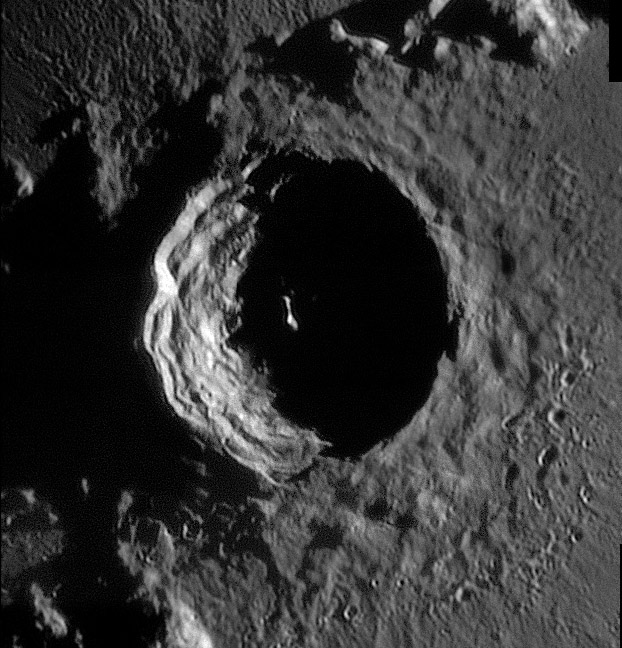Difference between revisions of "April 10, 2009"
| Line 3: | Line 3: | ||
<!-- ws:start:WikiTextHeadingRule:2:<h1> --> | <!-- ws:start:WikiTextHeadingRule:2:<h1> --> | ||
<!-- ws:start:WikiTextLocalImageRule:8:<img src="/file/view/LPOD-Apr10-09.jpg/67247571/LPOD-Apr10-09.jpg" alt="" title="" /> -->[[File:LPOD-Apr10-09.jpg|LPOD-Apr10-09.jpg]]<!-- ws:end:WikiTextLocalImageRule:8 --><br /> | <!-- ws:start:WikiTextLocalImageRule:8:<img src="/file/view/LPOD-Apr10-09.jpg/67247571/LPOD-Apr10-09.jpg" alt="" title="" /> -->[[File:LPOD-Apr10-09.jpg|LPOD-Apr10-09.jpg]]<!-- ws:end:WikiTextLocalImageRule:8 --><br /> | ||
| − | <em>image by [mailto:dpeach_78@yahoo.co.uk | + | <em>image by [mailto:dpeach_78@yahoo.co.uk Damian Peach,] U.K.</em><br /> |
<br /> | <br /> | ||
China did it. Japan did it; India too. Now apparently, Damian has sent a camera to orbit the Moon and is obtaining super high resolution images. Although the crater is not normally considered fresh, this remarkable image shows distinct ejecta details that sharply define deposition of ejecta on the glacis and surrounding terrain. The crater itself looks very deep, <em>like a bucket</em>, according to Damian, with the central peaks rising out of the darkness, just catching the first light of the new morning. A crisp scarp below the rim crest is delicately striped almost like bands in smaller craters. The terraces below the scarp are rounded and modified, perhaps by seismic shaking from nearby large scale impact cratering. This is a gorgeous image.<br /> | China did it. Japan did it; India too. Now apparently, Damian has sent a camera to orbit the Moon and is obtaining super high resolution images. Although the crater is not normally considered fresh, this remarkable image shows distinct ejecta details that sharply define deposition of ejecta on the glacis and surrounding terrain. The crater itself looks very deep, <em>like a bucket</em>, according to Damian, with the central peaks rising out of the darkness, just catching the first light of the new morning. A crisp scarp below the rim crest is delicately striped almost like bands in smaller craters. The terraces below the scarp are rounded and modified, perhaps by seismic shaking from nearby large scale impact cratering. This is a gorgeous image.<br /> | ||
<br /> | <br /> | ||
| − | <em>[mailto:tychocrater@yahoo.com | + | <em>[mailto:tychocrater@yahoo.com Chuck Wood]</em><br /> |
<br /> | <br /> | ||
<strong>Technical Details</strong><br /> | <strong>Technical Details</strong><br /> | ||
| Line 13: | Line 13: | ||
<br /> | <br /> | ||
<strong>Related Links</strong><br /> | <strong>Related Links</strong><br /> | ||
| − | [http://www.damianpeach.com/ | + | [http://www.damianpeach.com/ Damian's website]<br /> |
<br /> | <br /> | ||
<hr /> | <hr /> | ||
Revision as of 17:11, 11 January 2015
A Bucket of Darkness

image by Damian Peach, U.K.
China did it. Japan did it; India too. Now apparently, Damian has sent a camera to orbit the Moon and is obtaining super high resolution images. Although the crater is not normally considered fresh, this remarkable image shows distinct ejecta details that sharply define deposition of ejecta on the glacis and surrounding terrain. The crater itself looks very deep, like a bucket, according to Damian, with the central peaks rising out of the darkness, just catching the first light of the new morning. A crisp scarp below the rim crest is delicately striped almost like bands in smaller craters. The terraces below the scarp are rounded and modified, perhaps by seismic shaking from nearby large scale impact cratering. This is a gorgeous image.
Chuck Wood
Technical Details
April 3rd 2009, 20:30 UTC. 14" telescope at 51°35"N, 00°45"W.
Related Links
Damian's website



